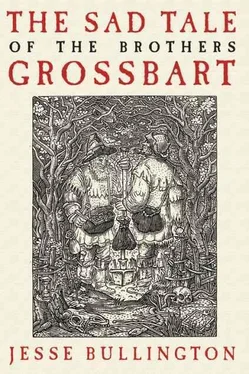“Why the bows?” the man said.
“Why’ve you got yours?” Hegel returned.
“What?” The man cocked his ear.
“Come on over,” Manfried said, “can’t hear you neither.”
The men advanced warily on the grinning Grossbarts. When they were close enough to make out their bearded countenances the men stopped. The driver called something from behind but none of the four paid him heed.
“What you doing out here?” the first man asked. He possessed a stringy black mustache that matched both the hair on his head and that of his fellow’s.
“Same’s you,” Hegel shot back.
“Seeing this,” Mustache said, “so you move that wood and stand clear and we be on ours, and you be on yours.”
“Well, now,” Manfried said, “that don’t seem fair.”
“Why this?” Mustache asked.
“We go through the trouble a movin it and you don’t even offer two weary travelers a ride?” said Hegel.
The second man said something to Mustache in a language the Brothers could not understand. Mustache responded in the same, and the second man raised his bow at Hegel. The Grossbarts cradled their crossbows lazily, but each had his weapon trained on one of the men.
“Move back,” Mustache said, “and we move it ourselves, and you have no reasons to gripe.”
“Fair’s fair,” Hegel said, immediately regretting the use of Nicolette’s phrase.
The Brothers stepped back and the two men advanced. They paused, glancing down at the log. Rotten though it was, they could not move it without setting down their weapons. The Grossbarts beamed at them. The men exchanged more indecipherable words, glaring at the Brothers.
“You win,” Mustache said, smiling himself now, “you move, and we give passage.”
“What’s stoppin you from shootin us when we set down our bows?” Manfried inquired.
“Same as stopping you from shooting we if we do the same,” Mustache snapped.
“Righteous Christian morals?” Hegel asked, but made no move to lower his weapon.
“Yes,” said Mustache.
“Ain’t cut it,” Manfried said. “We’s pious pilgrims, as shown by our Virgins.” He shook his head, the necklace bouncing on his tunic. “Where’s your proof?”
“Seeing this,” Mustache said, “it is not my wagon or we gladly grant you a ride. So sad, it is not. We are paid exactly so no one gets on wagon. We are paid to move logs. Seeing this, the log must go and you with it.”
“Move it, then,” Hegel said.
Mustache’s smile faded, and he exchanged more words with his compatriot. They began walking backward, away from the Brothers.
“We discuss with the driver,” Mustache called.
“You do that!” Hegel yelled, sitting down on the log.
“Should a shot those infidels where they lied,” Manfried said.
“How you know they’re infidels?”
“You see that one’s mustache? And the other’s definitely foreign. Finally, when asked for proof a faith they failed to produce.”
“None a that means nuthin. You’s thinkin too hard, as usual,” Hegel sighed.
“Why else they don’t give us a ride?”
“Probably cause we didn’t offer’em anythin.”
“Holy men don’t need to pay. Least not to any fellow Christian.”
“So you’s a holy man now?” Hegel snorted.
“Both a us is. Killed us a devil.”
“Wasn’t a devil, was a damn man what turned into one.”
“Same thing,” said Manfried.
“Hell it is.”
“Watch that blasphemy.”
Hegel perked up. “They’s comin back.”
Better still, the wagon followed. The second man sat on the bench beside the driver. Mustache walked ahead, smiling broadly but still training his bow on Hegel.
“You win,” Mustache said. “Move the log and give some coin and we all be on ours, but you off at the next town. Seeing this?”
Hegel began to answer but Manfried elbowed him, taking charge. “Right equitable. We’ll give you all the money we got soon’s we arrive.”
“Coin now.” Mustache sounded immovable.
“No security you’s honest, we pay upon delivery,” said Hegel.
“No proof you either. Coin now,” Mustache said.
“Hey you,” Manfried called to the driver. “We’ll give you all when we get to a town and not fore, deal?”
“See-” Mustache began, but the driver interrupted with a harsh string of those foreign words, then he looked to the Grossbarts. He appeared their age, with oily black hair and a thinner mustache, and finer clothes than anyone else present.
“No highwaying on this highway, yes?” the driver asked in a clipped accent.
“That’s right.” Hegel smiled.
“So you have my Christian word on a safe passage. If you will swear the same, we may progress.” The driver forced a smile.
“Given,” the Brothers said in unison.
“Then move that, and any other obstructions we chance upon, and no further payment will be necessary.” The driver smoothed the scalloped edge of his chaperon hat.
The two guards walked to the rear of the wagon, casting foul glances at the Brothers. Manfried kept his arbalest in hand while Hegel lifted one end of the dead log and rolled it to the side, then he picked up his weapon and they both set their feet on it, pushing it over the edge. Watching it pick up speed and finally blast apart on a boulder down the mountainside, they both ruminated on how they might approach a traveling wagon in the future in light of the difficulty in securing passage on this one.
They moved to enter the wagon but all three yipped at them to get on the bench and stay clear of the interior. Jamming their odorous bags under the hanging tarp behind their seat, they were off. A Grossbart sat on either end with the driver and the other foreign guard between them, Mustache presumably inside or on a rear seat.
The rocking wagon provided them with unobstructed views of the cliffs falling away from the road, and as the day lengthened so did the precipices. The highway wound up into the mountains, the snow and wind and hazy sky chilling the Brothers’ bones. Whenever a rockslide or other debris blocked the road they would climb down and move it, but these breaks were infrequent. They moved slowly but still managed a great distance more than the Grossbarts would have on foot before sundown. They stopped in a lightly wooded meadow presiding above the day’s road.
The Grossbarts made their own fire farther up the road lest their new friends attempt to flee in the dark. They took shifts, and when Hegel felt his ears itch he ensured that he made a lot of noise loading his crossbow. He heard footsteps retreat back to the foreigners’ fire and he returned to his horse-marrow stew.
The next day passed in similar fashion, as did the one after that-except the Grossbarts’ rations shrank with each meal. During their nocturnal vigils nothing braved the firelight, so their stomachs remained the only things growling. The third morning never fully came, the flurries replaced by heavy snow blotting out everything but the road in front of the horses. The Brothers debated, in their sibling language, the benefits of abandoning the wagon, reckoning they would make the same time and not have to worry about tumbling over the edge if the horses stepped wrong in the drifts.
They moved through a white fog of snow, steam pouring off the horses, snot freezing in the Brothers’ beards. Only the cliffs jutting up on one side and falling away on the other told them they kept the road. Any banter the men had provided over the previous days had frozen on their lips. They traveled slowly, and Hegel sensed something foreboding in the snow, something sinister waiting up the road. He told his brother, who nodded and readied his crossbow. The attack Hegel knew would come never did, and several hours later the foreigners shouted in triumph.
Читать дальше












